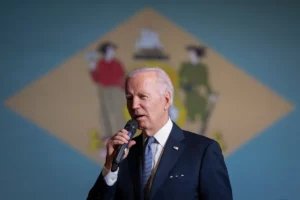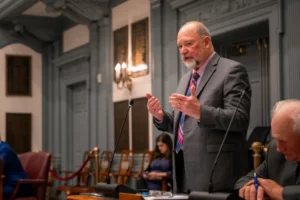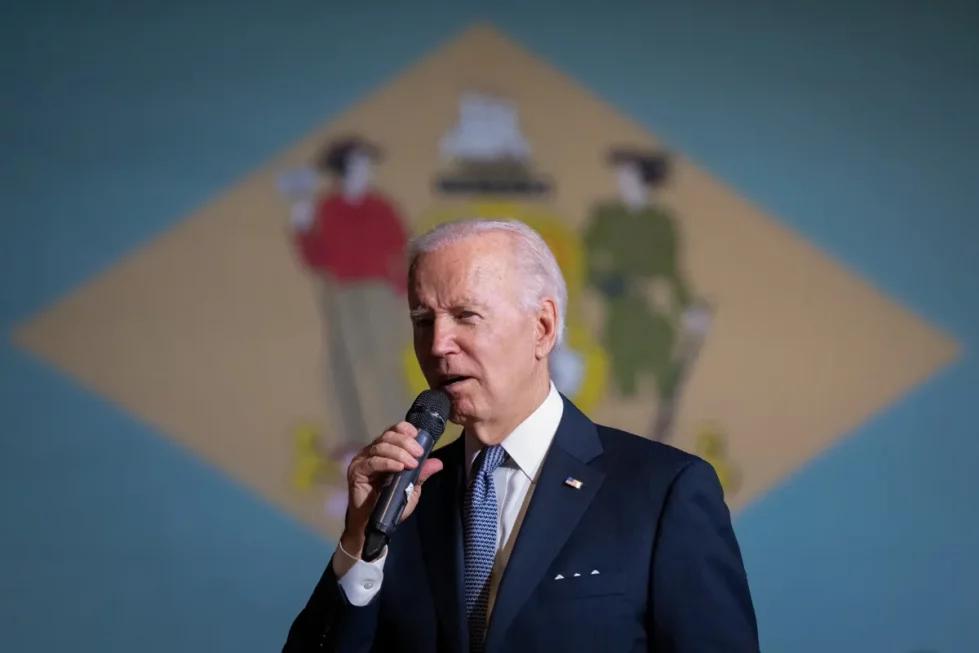

President Joe Biden returned to Delaware 30 times last year, but those visits left state taxpayers with a $400,000 bill for fuel costs to his local security detail. | PHOTO COURTESY OF THE WHITE HOUSE / ERIN SCOT
President Joe Biden’s frequent trips back to his home state have become routine to most Delawareans more than three years into his term, but the scores of trips have also become a drain on state coffers and the downtime of troopers.
Last year, Biden returned to Delaware 30 times, or nearly three times the number of visits as those to Pennsylvania and Maryland, which ranked second with 11 trips each.
The purpose of visits have ranged from attending the dignified transfer of fallen military members at Dover Air Force Base, visiting with campaign staffers in Wilmington, announcing major policy initiatives in Bear or simply getting some rest at either his Greenville or Rehoboth Beach-area homes.
Every time the president moves within the state, however, the U.S. Secret Service requests a variety of law enforcement, emergency medical and transportation logistics support to ensure his safe and quick travel. The local agency most burdened by those movements – which numbered more than 130 in 2023 – is the Delaware State Police.
Operational support for Biden’s visits, including several special units and command and control elements from DSP, encompassed a total of 14,448 man hours, according to Col. Nathaniel McQueen Jr., secretary for the Delaware Department of Safety & Homeland Security that oversees the statewide police force.
What does it take?


According to McQueen, the number of troopers involved in Biden’s movements could number as many as 50 and include department SUVs, helicopters, bomb trucks, command posts, motorcycles, Special Operations Response Team (S.O.R.T.) vehicles, and other specialty vehicles. DSP declined to disclose specific numbers of troopers assigned to the presidential detail in various scenarios as it “could jeopardize safety and security protocols.”
Typically leading DSP’s efforts is Troop 1, the barrack headquartered off Kirkwood Highway near the president’s Greenville home, which is where Biden spends the majority of his time in state.
Other police agencies, including the New Castle County and Wilmington police departments, have been called upon to help with presidential detail and each county provides an ambulance crew that travels with the president in case of emergency.
Feds cover some Biden costs
Recognizing that presidential visits carry a cost to local agencies, the U.S. Department of Homeland Security approved the Presidential Residence Protection Assistance grant in 2017. The grants reimburse state and local law enforcement agencies for operational overtime costs incurred while protecting the president at home.
The Delaware Criminal Justice Council, a state clearinghouse entity that handles all federal grant applications for state law enforcement agencies, collects the necessary data and is reimbursed following the end of the Sept. 30 federal fiscal year.
Over the first two fiscal years of the Biden administration, Delaware has recouped more than $3.5 million from the PRPA fund.
However, the grant only covers officers on overtime duty, and no funds can be reimbursed for officers on regular duty. On occasion, regular duty troopers are needed for Biden’s protection based on staffing levels and unexpected movements.
“We don’t pull [troopers] off of a shift unless it’s an emergent situation … By and large, we try to staff that in an overtime capacity just for the purpose of recouping the expense and not depleting the patrol or CIU [Criminal Investigation Unit],” Delaware State Police Superintendent Col. Melissa Zebley told the state legislature’s Joint Finance Committee last month.
One significant cost that the state cannot recoup is fuel costs for the vehicles utilized though. Last year, that totaled about $400,000 when accounting for patrol cars, helicopters and specialty vehicles, according to DSP.
Department leaders are asking state taxpayers to cover that cost in the upcoming Fiscal Year 2025 budget – a reality that McQueen told state legislators was “a challenge.”
When asked about the detail’s costs to state police, a White House spokesperson said only that President Biden is thankful for the support of local law enforcement.
“President Biden traveled home to Wilmington every day during his 36-year Senate career, and Delaware is never far from his heart. Now as President, he’s grateful for the welcome he receives from Delawareans when he is able to return home to Wilmington and Rehoboth. And he’s immensely grateful for the law enforcement officers who help protect him and his family on their travel to Delaware and every other state in the union,” said Robyn Patterson, assistant press secretary for the White House.


State Sen. David Lawson (R-Marydel), a retired state trooper, expressed concern with the strain that frequent overtime duty was having on state troopers for the Biden detail. | PHOTO COURTESY OF DE SENATE GOP
A personnel cost
Aside from the financial cost to state taxpayers of Biden’s frequent trips home, the visits are also an additional burden on the rank-and-file of Delaware’s law enforcement agencies, who are contending with dwindling staffing levels.
With upward of 50 troopers called to duty for Biden’s movements, it means that an estimated 15% of troopers are being utilized on their scheduled off days from 12-hour shifts.
Like many law enforcement agencies, DSP has faced challenges in boosting its ranks and still must confront a rising number of retirements in coming years.
As of last month, Delaware State Police had 699 sworn active-duty troopers, according to a department spokeswoman. That total included 19 recruits who are scheduled to graduate soon, however, and DSP has an approved budget for up to 750 troopers.
The state police has seen falling interest in recruitment in the last five years, with applications falling about 70% since 2018, according to Zebley. The latest 31-person recruiting class was the largest in several years. A decade ago, it was common to have a few thousand applicants while today that number is around 100.
FROM LEGHALL: So many people had something to say about a proposed homeless bill of rights, the discussion was continued
Requests for comment on that impact to trooper morale and readiness were not returned by leaders of the Delaware State Troopers Association, the union for state troopers.
State Sen. David Lawson, R-Marydel, who retired from DSP in 1992 after serving 19 years as a trooper, questioned the impact that the duties were having though. He said that getting a fully scheduled rest was “critical” for a law enforcement officer, especially under the current 12-hour shift model.
“That shift is excruciatingly long,” he said, noting that the requirements of the president’s frequent visits only adds to the overall stress and fatigue to those officers. “When it comes to moving the president, [DSP] is short-changed in a lot of ways in taking care of the hometown boy.”
This story was originally published on Spotlight Delaware. Get stories like this delivered to your email inbox by signing up for the free newsletter at spotlightdelaware.org/subscribe.
Share this Post



